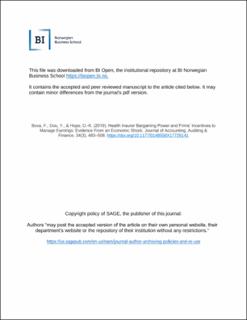Health Insurer Bargaining Power and Firms’ Incentives to Manage Earnings: Evidence From an Economic Shock
Journal article, Peer reviewed
Accepted version
Permanent lenke
https://hdl.handle.net/11250/2657029Utgivelsesdato
2019Metadata
Vis full innførselSamlinger
- Publikasjoner fra CRIStin - BI [1015]
- Scientific articles [2181]
Originalversjon
Journal of Accounting, Auditing and Finance. 2019, 34 (3), 483-508. 10.1177/0148558X17726141Sammendrag
Health insurance premiums account for a significant portion of the cost base of U.S. corporations. A recent study finds that health insurance premiums increase for firms that experience positive profit shocks, suggesting that the U.S. health insurance market is not perfectly competitive. Motivated by this finding and the economic importance of health insurance premiums, this is the first study to examine firms’ earnings management incentives in the face of insurance carriers with strong bargaining power. We use an innovative data set for a large sample of U.S. firms with detailed information on insurance premiums and insurance plan characteristics. Using an economic shock to insurance firms’ bargaining power and difference-in-differences tests, we find that firms manage their reported earnings downward when insurance providers have strong bargaining power. We further show that this effect is more pronounced in settings in which there are ex ante reasons to expect stronger incentives to manage earnings downward. We also provide preliminary evidence suggesting that downward earnings management has the intended effect of mitigating future increases in health insurance premiums. Our analyses highlight an inefficient health insurance market as an important determinant of firms’ financial reporting choices.
